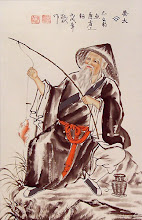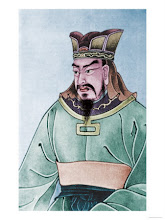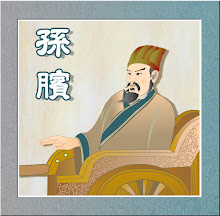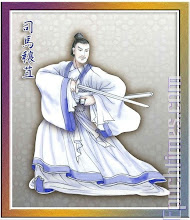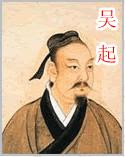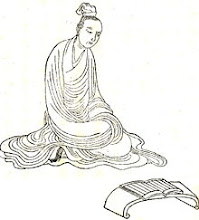Friday, October 31, 2008
What is the Tao of military?
When King Wu asked Jiang Ziya (Tai Gong): "What is the Tao of the military?"
Jiang Ziya said, "In general, as for the Tao of military, nothing surpasses unity."
Unity is the most important factor in the military. If there is unity, soldiers will stick together like brother. One taking care of the other, fight for each other and die together with honor. Unity is teamwork, therefore when orders are passed down, everyone is clear about the instructions. Disunity corrupt the whole military operation, bringing chaos and miscalculation. Therefore even if a general have the best winning strategies in the world, he will still lose because of the disunity among the army.
In Sun Tzu's Art of War, one of the six values of a general is trustworthy. Only with trustworthy, the soldiers will listen the orders of the generals and die for him.
In Zhuge Liang's Jiang Yuan, it stated that general should not be arrogant for they will become discourteous and people will rebel against him/her. A general should not be stingy for he/she will not reward the trustworthy and the soldiers will not be dedicated. Therefore strict instructions are given and discipline must be observed within the army. Make sure that rewards and punishments are clear so that the soldiers will trust the general and die fighting for him.
A wise general will show concern to the soldiers, he will treat them as brothers. Wu Qi, a famous winning strategist, emphasized on the unity of the army. When Wu Qi discovered that one of his soldiers is suffering from a painful boil, he went to the soldier and use his mouth to suck out the boil. The soldiers was shocked and touched by Wu Qi's actions and swear loyalty to him, when the whole army know about it, the morale of the army increased.
In modern day, organizations requires teamwork, therefore friendship counts. Friendship brings people closer to one another, this is unity. Therefore when chaos reigns or a problem appears, they will work together to solve the problem, they will never be apart from each other.
What is Tao?
In Sun Tzu's Art of War, the first factor among the five factors was Tao. In this case, Tao refers to the agreement between the Sovereign and his people. In order for the sovereign to win the hearts of the people, he must go with the agreement of the people.
In the Three Strategy of Yellowstone Elder, the superior strategy stated that if the general or sovereign has the same likes as the masses, there is nothing he will not accomplish.
In Sima's Rules of War, Sima Ranju said that the Tao is about benevolence. "Neither contravening the seasons nor working the people to exhaustion, neither attacking a state in national mourning nor taking advantage of natural disaster, or not mobilize the army in either winter or summer, this is the mean of loving the people, both yours and your enemy's."
While in another different case, Sun Tzu's Art of War stated that the Tao of Warfare is about deception, this is stated in the first chapter of Sun Tzu's Art of War.
Therefore, there are many different types of Tao, all are not meant to be the same. For Lao Tzu said, "Tao is not real Tao, a name may not be the real name." Therefore, a path may not be the real path to victory. Good path may turn to bad path, things in the world will change over times, thus people does not use a single path to be successful, there maybe shortcuts or even long and difficult path. For "A thousand journeys beginning with one step."
Sunday, October 19, 2008
Fight or not to Fight
How to win over the hearts of people?
- Go with the interest of the people, not against
- Government must be observant
- Do not go to war due to self anger or frustration
- The sovereign must practice virtue and wisdom
- He must not take people's expenses to satisfy his personal desire
- He must not resort to violence and torturing
"The world is not the private possession of the ruler but the common property of all. He who shares the benefits of the world gains the world, he who tries to grab the benefits of the world all for himself is certain to lose the world."
Sunday, October 12, 2008
Dealing with an Enemy in Battlefield
When dealing with an enemy, firstly know your enemy and yourself. Next, compare them to your army. Do not underestimate an enemy when it is weak.
Before the war starts, always get to the battlefield before the enemy in order to seize an advantageous position. If your enemy got the advantageous position, do not attack and withdraw from the battlefield. There are many ways to win a battle according to the amount of your army:
- If your army outnumber the enemy, surround them and attack
- If your army is five times of the enemy, attack them directly
- If your army is double the size of the enemy, divided them into two and attack enemy from the front and back.
- If your army is equal to the enemy, challenges them and ploy strategy to defeat them
- If the enemy outnumber your army, withdraw from battle
In the 1st chapter of Sun Tzu’s Art of War, it stated: when facing the enemy, pretend to be weak and inactive, pretend to be far when the target is near. When your target is far away, pretend to attack a nearby place. With this, the enemy will think that you are weak and will lower his/her army security.
These are some basic way of dealing with the enemy.
Wednesday, October 8, 2008
Know Yourself and your Enemy!!!
知彼知己,百戰不殆;不知彼而知己,一勝一負;不知彼,不知己,每戰必敗
The statements above were the most famous quotes of all times, for it was used not only in war, but only competition and businesses. So what it means?
· But if you know yourself and not your enemy, then you can win a battle and lose another
· If you know neither yourself nor your enemy, then you will simply be defeated
This is a basic knowledge for generals in Ancient China. To know yourself, identify your strength and weakness. To know the enemy, usage of spies and scout mostly and essentially needed. One must learn from the previous battle through reconnaissance.
Find the strengths and weaknesses of both you and your enemy and compare them. So who have more strength or weakness? If the enemy is very strong, then avoid any battle. If the chances of winning are high for you, then continue and defeat the enemy.
In battle, when dealing with the enemies, identify the enemy’s formation and find the strength and weakness. If the formation is complex and extraordinary, then avoid battle. If the enemy’s morale is high, avoid fighting with them. If there is a flaw in the enemy’s arrangement, then attack them to break their formation. Even though a general knows the enemy very well, he/she must never underestimate a weak enemy or lower his/her guard down.
Knowing your enemy also means knowing the names of the enemy’s generals. In the Battle of the Red Cliff, Zhou Yu knew that Cai Mao and Zhang Yun have just surrendered to Cao Cao, therefore he wrote a fake letter talking about the secret alliance with Cai Mao and Zhou Yu. When Cao Cao found it, he immediately executes the two generals. The strategy was known as “Kill with a borrowed knife”



